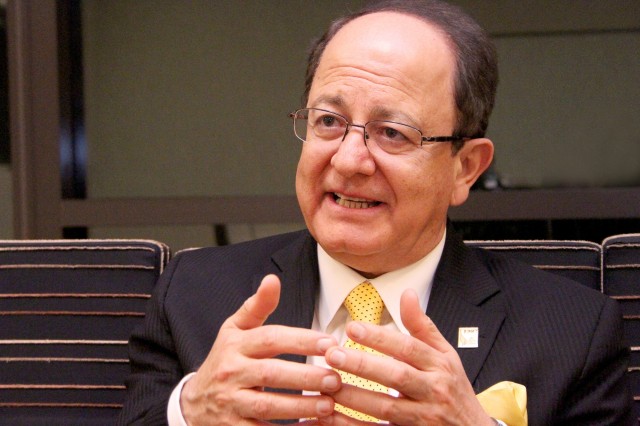
C.L. Max Nikias is president of the University of Southern California, where he also holds faculty appointments in classics and engineering. Before participating in a panel on whether universities can save cities, he sat down in the green room to offer some advice from ancient Athenians on politics and curing the hiccups.
Q. If you had one more hour in the day, what would you do with it?
A. Exercise.
Q. You were born in Cyprus. Do you cook any Cypriot dishes?
A. I’m really good at cooking Greek souvlaki, and I also make Greek salad.
Q. What’s your biggest weakness?
A. Some people see it as a strength, others as a weakness: I tend to be a workaholic.
Q. What’s the most important element to a successful party?
A. You’ve got to invite the right people and have the right mixture of people with different interests, so when people walk away from it they feel they had fun but also they learned something.
Q. What could the presidential candidates learn from the politicians of ancient Athens?
A. When I teach micro-seminars I say we all can learn from the politicians from Athens, from their successes but also from their failures. Sometimes you learn more by studying the failures of the Athenians than their successes.
Q. Since tonight’s event is taking place in the Yosemite Room at The California Endowment, I thought I’d ask, what’s your favorite California park?
A. Joshua Tree.
Q. What person, living or dead, would you most like to have a beer with?
A. The Athenian leader Themistocles. To me, he was the Abraham Lincoln of Athens-he saved the young democracy in the Straits of Salamis, and that’s how he became so powerful and caused the arts there to blossom for the next 50 years. And the Roman philosopher and politician Cicero, although Cicero, according to the history books, drank wine. He would have a glass of wine every morning-there were no teas or coffees back then.
Q. What’s your cure for the hiccups?
A. In Plato’s Symposium the comedian Aristophanes gets the hiccups, so one of Plato’s students tells him how to get rid of them: you get a little feather, try to put it down your mouth, and you get the sensation that you’re going to throw up, but you don’t-and the hiccups stop.
Q. Whom do you go to for advice?
A. There are a number of people-they are much older than me. There are two in particular who have been mentors to me, and the advice I give to anyone who has a leadership position is that it’s good to have someone you trust, someone who has a lot of experience, but also a disinterested person.
Q. What’s a Greek word you wish we had in English?
A. The ancient Greek language is very poetic when you read it, very compact. With very few words you can describe something that, translated in English, may take a paragraph to describe, when actually it’s only one and a half lines in ancient Greek. When I teach students Antigone’s Sophocles, I always choose a book that has on the left the ancient Greek and on the right the English translation. I’m always looking for the English translation that is closest to the meaning of the Greek, and when I found one finally, the English text was still much longer than the ancient Greek. So it isn’t the word-to-word, but just the nature of the language that is not as compact, at least for that text or those meanings.
*Photo by Sarah Rivera



